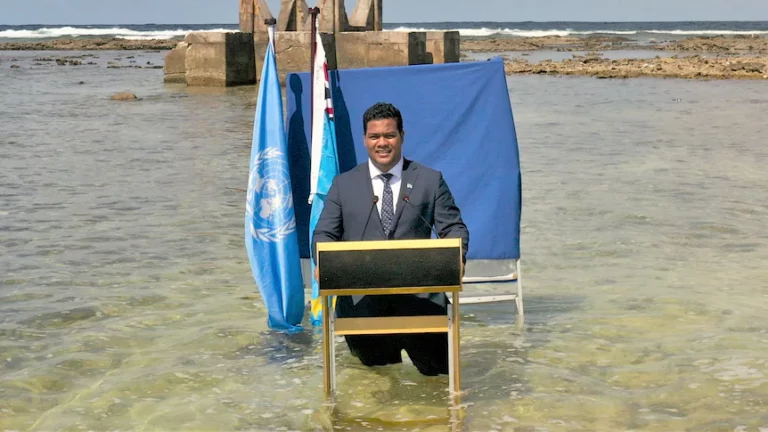With rising sea levels threatening the nation of Tuvalu’s existence above water, their foreign minister seeks digital alternatives.
As sea levels continue to rise, the nation of Tuvalu must seek drastic measures to preserve the physical land its people currently live on in a digital space, while global economic powers fail to meet climate promises.
Tuvalu’s Foreign Minister, Simon Kofe, addressed the COP27 climate summit in Egypt, plainly stating that Tuvalu’s time as a physical space in this world is running out— leading the nation to turn to a digital space in the Metaverse, where images and scans of their country can continue to exist as the real country is continually swallowed by the rising ocean.
Tuvalu’s website, which shares information about the project and an email template you can use to contact heads of state in your country, can be used as a resource to keep up to date with the status of Tuvalu.
The decision to move to the Metaverse comes one year after COP26, when Kofe addressed other nations while standing knee-deep in seawater around the main islet of Fongafale. Tuvalu’s capital city, Funafuti, which resides on Fongafale, can experience high tides that submerge up to 40% of its area.
Karlos Lee Moresi, Tuvalu’s former Secretary of Finance, reported that Tuvalu could be completely underwater by the turn of the next century, while others, such as Kofe and Reuters, estimate that the country could be submerged within decades.
Love Music?
Get your daily dose of metal, rock, indie, pop, and everything else in between.
“Our land, our ocean, our culture are the most precious assets of our people and to keep them safe from harm, no matter what happens in the physical world, we will move them to the cloud,” Kofe said while addressing COP27 against the backdrop of a digital replica of an islet threatened by rising sea levels.
“The idea is to continue to function as a state and beyond that to preserve our culture, our knowledge, our history in a digital space,” Kofe told Reuters.
Faced with threats to their way of life, the nation of Tuvalu is desperately seeking a way to preserve the memory of its islands. Beyond that, the people will continue to exist despite being driven from their homes, so what becomes of their nation if it doesn’t exist in the physical world?
Tuvalu isn’t the only nation that is forced to address such questions, as the Pacific island country of Vanuatu is seeking funds for countries such as theirs to cop with the “loss and damage” fueled by anthropogenic climate change.
Last year’s pleas at COP26 for restorative funds for the hardest-hit countries, which resulted in only a three-year dialogue on the matter, were considered a failure.
Regenvanu, a former minister of Vanuatu who worked on land issues, said the country’s government was not able to do enough to help people living in low-lying areas near the sea, where saltwater was continuously encroaching on their soil.
“Now we are seeing much more issues like heavy rainfall causing landslides … [and] large areas becoming uninhabitable because of water damage and flooding,” he said.
“So we’re going to have to look into large-scale resettlement of people within the country.”
“Right now, people are just moving with their feet – they are just leaving areas … They have got to move otherwise their lives are in danger,” he said. Unlike Tuvalu, Vanuatu people could at least relocate to higher ground in mountainous parts of the islands.
“Sea level rise won’t destroy our country,” he said, adding that lower-lying Pacific island states like Tuvalu and Kiribati will not be able to avoid that same threath.

































